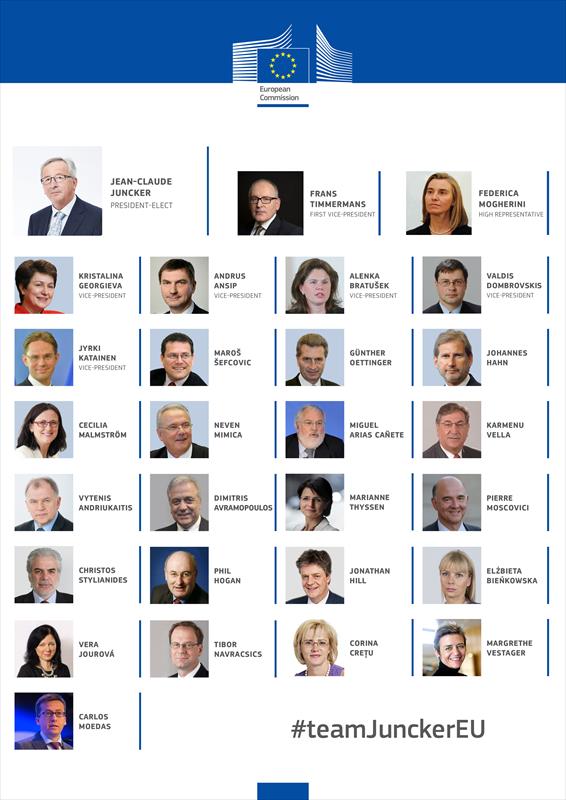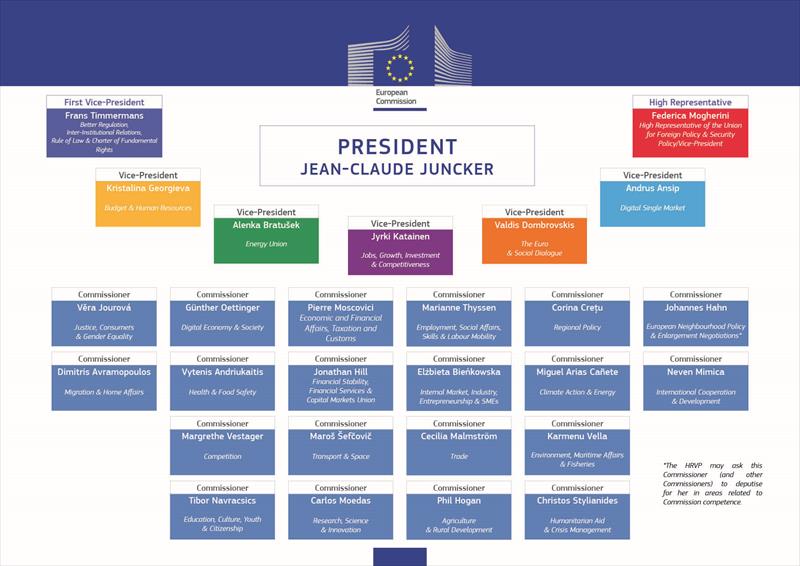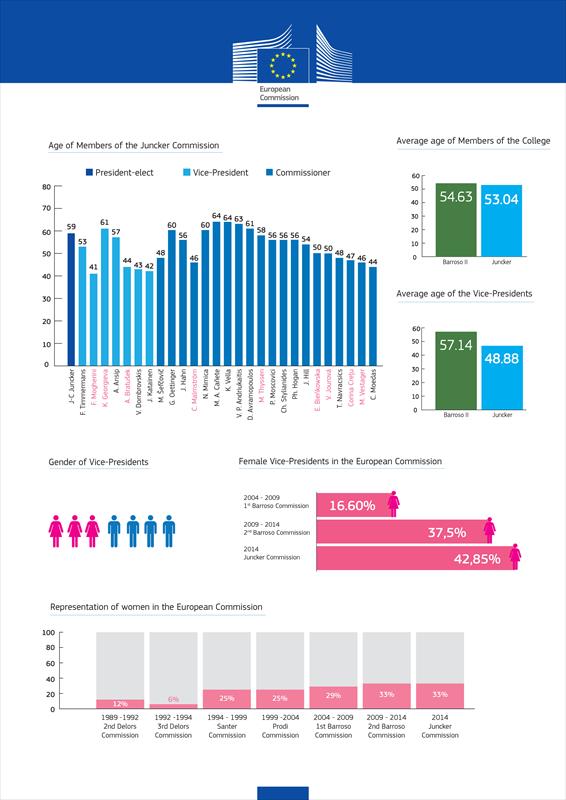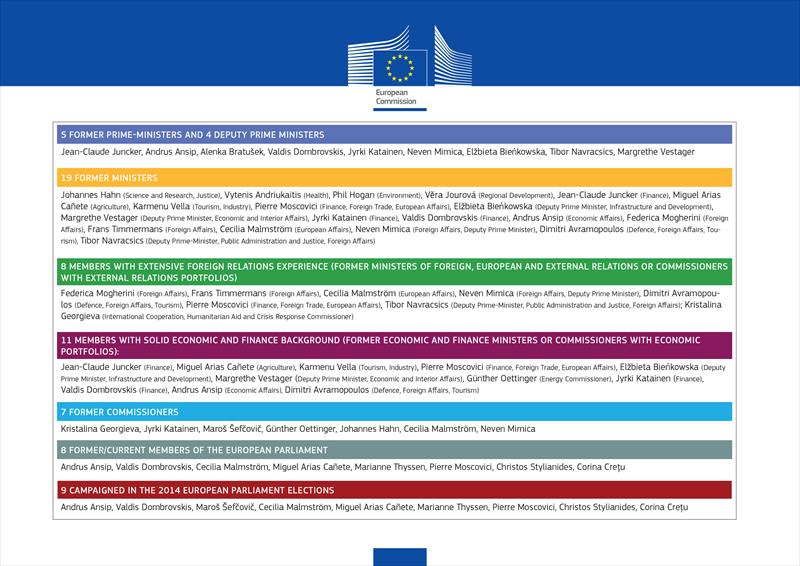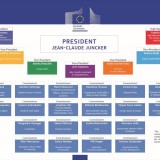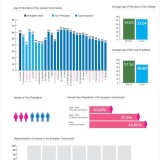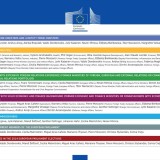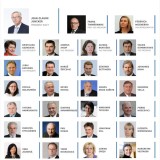Following the EU-wide campaign for the elections to the European Parliament, Jean-Claude Juncker was proposed as candidate for President of the European Commission by the European Council on 27 June 2014. He was elected to become the next President of the European Commission by a majority of 422 votes in the European Parliament’s plenary session of 15 July 2014.
After the European Union has come through one of the most testing periods in its history, one of the biggest challenges will be to convince citizens that things will change. To deliver change, the Commission needs to be open to reform, Mr Juncker said.
“In these unprecedented times, Europe’s citizens expect us to deliver. After years of economic hardship and often painful reforms, Europeans expect a performing economy, sustainable jobs, more social protection, safer borders, energy security and digital opportunities. I am presenting the team that will put Europe back on the path to jobs and growth. In the new European Commission, form follows function. We have to be open to change. We have to show that the Commission can change. What I present to you is a political, dynamic and effective European Commission, geared to give Europe its new start. I have given portfolios to people – not to countries. I am putting 27 players in the field, each of whom has a specific role to play – this is my winning team,” said President-elect Juncker.
The new European Commission will be streamlined to focus on tackling the big political challenges Europe is facing: getting people back to work in decent jobs, triggering more investment, making sure banks lend to the real economy again, creating a connected digital market, a credible foreign policy and ensuring Europe stands on its own feet when it comes to energy security. The new way the Commission will be set up reflects these Political Guidelines, on the basis of which Jean-Claude Juncker was elected by the European Parliament.
A new way of working
The new College will have seven Vice-Presidents, six in addition to the High Representative of the Union for Foreign Policy and Security Policy (Federica Mogherini), each leading a project team. They will be steering and coordinating the work of a number of Commissioners in compositions that may change according to need and as new projects develop over time. These project teams mirror the Political Guidelines. Examples include ‘Jobs, Growth, Investment and Competitiveness’, ‘Digital Single Market’ and ‘Energy Union’. This will ensure a dynamic interaction of all Members of the College, breaking down silos and moving away from static structures. “In the new Commission, there are no first or second-class Commissioners – there are team leaders and team players. They will work together in a spirit of collegiality and mutual dependence. I want to overcome silo-mentalities and introduce a new collaborative way of working in areas where Europe can really make a difference,” said Juncker.
The European Parliament hearings of the Commissioners-designate provide a democratic process for explaining and vetting the Commission’s objectives and political programme.
Political Experience
The proposed Juncker Commission includes 5 former Prime Ministers, 4 Deputy Prime Ministers, 19 former Ministers, 7 returning Commissioners and 8 former Members of the European Parliament. Eleven of these have a solid economic and finance background, whilst 8 have extensive foreign relations experience. The Juncker Commission has the necessary expertise to tackle the current economic and geopolitical challenges that Europe is facing.
Important innovations
• A First Vice-President, Frans Timmermans, will be the “right-hand” of the President. This is the first time that there is a Commissioner dedicated to a Better Regulation agenda, guaranteeing that every Commission proposal is truly required and that the aims cannot best be achieved by Member States. The First Vice-President will also act as a watchdog, upholding the Charter of Fundamental Rights and the Rule of Law in all of the Commission’s activities.
• The new Internal Market, Industry, Entrepreneurship and SME portfolio under Elžbieta Bieńkowska will be the engine house of the real economy. There is also for the first time a specific mention of small and medium-sized enterprises, the backbone of our economy.
• The new Economic and Financial Affairs, Taxation and Customs portfolio under Pierre Moscovici will ensure that taxation and customs union policies become part and parcel of a deep and genuine Economic and Monetary Union and contribute to the smooth functioning of the overall economic governance framework of the EU.
• A strong consumer portfolio has been created. Consumer policy is no longer scattered across different portfolios but has a prominent place in the portfolio of the Commissioner for Justice, Consumers and Gender Equality, Věra Jourová.
• As the President-elect announced in this speech before the European Parliament on 15 July, he has also designated a Commissioner specifically for Migration, Dimitris Avramopoulos, to prioritise a new policy on migration that will robustly tackle irregular migration, whilst at the same time making Europe an attractive destination for top talent.
• A number of portfolios have been reshaped and streamlined. Significantly, the Environment and Maritime Affairs and Fisheries portfolios have been combined under Karmenu Vella to reflect the twin logic of “Blue” and “Green” Growth – environment and maritime conservation policies can and should play a key role in creating jobs, preserving resources, stimulating growth and encouraging investment. Protecting the environment and maintaining our competitiveness have to go hand-in-hand, both are about a sustainable future. The same logic has been applied in deciding to establish one Commissioner in charge of both Climate Action and Energy policy under Miguel Arias Cañete. Strengthening the share of renewable energies is not only a matter of a responsible climate change policy. It is, at the same time, an industrial policy imperative if Europe still wants to have affordable energy in the medium term. Both new portfolios will contribute to the Project Team ‘Energy Union’ steered and coordinated by Alenka Bratušek.
• The European Neighbourhood Policy and Enlargement Negotiations portfolio under Johannes Hahn, next to a reinforced neighbourhood policy, puts the focus on the continuation of enlargement negotiations, whilst acknowledging that there will be no enlargement of the European Union for the next five years, as President-elect Juncker set out in his Political Guidelines.
• The new Financial Stability, Financial Services and Capital Markets Union portfolio under Jonathan Hill will focus the existing expertise and responsibility in one place, a newly created Directorate-General, and ensure the Commission remains active and vigilant in implementing the new supervisory and resolution rules for banks.
Next Steps
As the next step, the European Parliament has to give its consent to the entire College of Commissioners, including the President and the High-Representative Representative of the Union for Foreign Affairs and Security Policy/Vice-President of the European Commission. This is preceded by hearings of the Commissioners-designate in the relevant parliamentary committees, in line with Rule 118 of the Parliament’s Rules of Procedure. Once the European Parliament has given its consent, the European Council formally appoints the European Commission.
For more information:
Homepage of President-elect Jean-Claude Juncker:
http://ec.europa.eu/about/juncker-commission
Political Guidelines for the Next European Commission: ‘A New Start for Europe: My Agenda for Jobs, Growth, Fairness and Democratic Change’:
http://ec.europa.eu/news/eu_explained/140715_en.htm
Follow the President-elect on Twitter: @JunckerEU #TeamJunckerEU
Follow the Spokespeople of the President-elect on Twitter: @MargSchinas, @Mina_Andreeva,@NatashaBertaud

